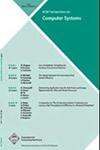体验在SMMP操作系统中分发对象
IF 1.8
4区 计算机科学
Q2 COMPUTER SCIENCE, THEORY & METHODS
引用次数: 57
摘要
设计和实现系统软件以便在共享内存多处理器(smmp)上很好地扩展已被证明是非常具有挑战性的。为了提高可伸缩性,到目前为止,大多数设计人员都通过迭代地消除对锁的需求和减少锁争用来关注并发性。然而,我们的经验表明,局部性即使不是更重要,也是同样重要的,关注局部性最终会导致一个更具可扩展性的系统。在本文中,我们描述了一种方法和框架,用于构建局部性系统软件,利用类似于分布式系统中使用的技术。具体来说,我们发现有两种技术可以有效地提高SMMP操作系统的可伸缩性:(i)一个面向对象的结构,通过提供从独立请求到独立代码路径和数据结构的自然映射来最大限度地减少共享,以及(ii)对象实现的选择性分区、分布和复制,以改善局域性。我们描述了分布式对象的具体例子和我们实现它们的经验。我们证明了分布式实现提高了操作系统密集型并行工作负载的可伸缩性。本文章由计算机程序翻译,如有差异,请以英文原文为准。
Experience distributing objects in an SMMP OS
Designing and implementing system software so that it scales well on shared-memory multiprocessors (SMMPs) has proven to be surprisingly challenging. To improve scalability, most designers to date have focused on concurrency by iteratively eliminating the need for locks and reducing lock contention. However, our experience indicates that locality is just as, if not more, important and that focusing on locality ultimately leads to a more scalable system.
In this paper, we describe a methodology and a framework for constructing system software structured for locality, exploiting techniques similar to those used in distributed systems. Specifically, we found two techniques to be effective in improving scalability of SMMP operating systems: (i) an object-oriented structure that minimizes sharing by providing a natural mapping from independent requests to independent code paths and data structures, and (ii) the selective partitioning, distribution, and replication of object implementations in order to improve locality. We describe concrete examples of distributed objects and our experience implementing them. We demonstrate that the distributed implementations improve the scalability of operating-system-intensive parallel workloads.
求助全文
通过发布文献求助,成功后即可免费获取论文全文。
去求助
来源期刊

ACM Transactions on Computer Systems
工程技术-计算机:理论方法
CiteScore
4.00
自引率
0.00%
发文量
7
审稿时长
1 months
期刊介绍:
ACM Transactions on Computer Systems (TOCS) presents research and development results on the design, implementation, analysis, evaluation, and use of computer systems and systems software. The term "computer systems" is interpreted broadly and includes operating systems, systems architecture and hardware, distributed systems, optimizing compilers, and the interaction between systems and computer networks. Articles appearing in TOCS will tend either to present new techniques and concepts, or to report on experiences and experiments with actual systems. Insights useful to system designers, builders, and users will be emphasized.
TOCS publishes research and technical papers, both short and long. It includes technical correspondence to permit commentary on technical topics and on previously published papers.
 求助内容:
求助内容: 应助结果提醒方式:
应助结果提醒方式:


